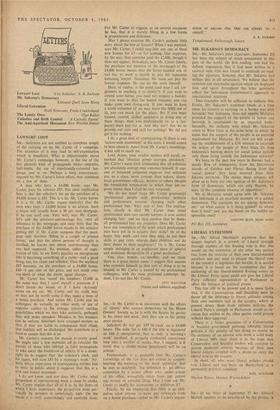MR. SUKARNO'S DEMOCRACY
SIR,—Mr. Sukarno's letter (Spectator, September 20) has been the subject of much amusement in this part of the world. On first reading, one had the definite impression that it had been written in a satirical vein. One was forced to conclude on read- ing the signature, however, that Mr. Sukarno had written this in all seriousness. We believe that the cynicism and nationalist egotism which are displayed time and again throughout the letter genuinely reflect the Indonesian Government's approach to international relations.
Two examples will be sufficient to indicate this. Firstly, Mr. Sukarno's statement (made at a time when his country is carrying on a border war with Sarawak) that Indonesia 'does not oppose Malaysia provided the support of the people in Sabah and Sarawak is ascertained by an impartial body.' Secondly, the audacity with which Mr. Sukarno refers to West Irian in the same letter in which he states that the support of the people is an essential requirement for Malaysia. We here are still await- ing the establishment of a UN mission to ascertain the wishes of the people of West Irian. Or does Indonesia's burning desire for social justice include only those living outside the Indonesian colonies?
We have in the past few years in Borneo had a steady flow of immigrants, from the Indonesian islands of Celebes and Flores, fleeing from the 'social justice' they have received from their Jakarta overlords. The stories these refugees tell allow us to form our own opinion of Mr. Sukarno's form of democracy which can only flourish, he says, 'in the complete absence of opposition.'
We in Malaysia would agree with Mr. Sukarno that Indonesia is an excellent example of a guided democracy. The` questions we are asking, however, are: on what course is it being guided? to where does it lead? and, are the hands on the rudder re- sponsible ones?
PO Box 203, Sandakan
EDMUND QUER SEOW HONG










































 Previous page
Previous page